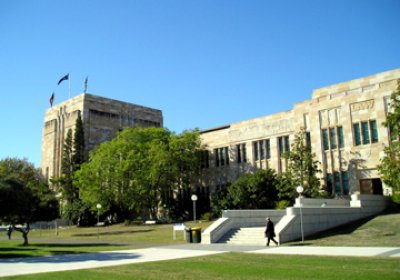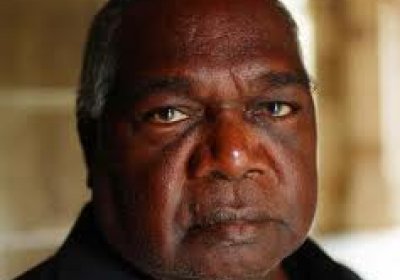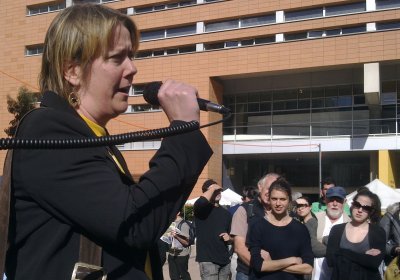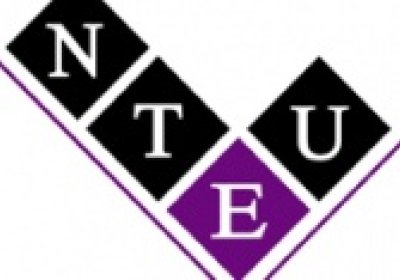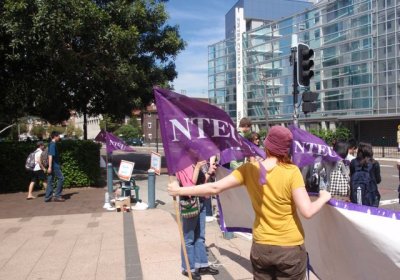In an attempt to divide staff, on September 13 management at Macquarie University (MQ) proposed to split the current Enterprise Agreement in two, and tried to ram through a second-rate agreement for general staff.
If successful this would mean MQ general staff would have the worst conditions of any of the 26 agreements across Australian universities. This has angered the local National Tertiary Education Union (NTEU) branch.
The NTEU is campaigning to defeat the push by calling for a “No” vote in a ballot of general staff set to open on September 23.
Education
BRISBANE — A meeting of about 150 members of the National Tertiary Education Union (NTEU) at the University of Queensland on August 5 passed a motion of no-confidence in UQ vice-chancellor Paul Greenfield.
The meeting voted to start rolling stop-works within two weeks if they do not receive an improved pay offer from university management.
UQ staff are due to receive only a 3.1% pay increase for 2010. An NTEU leaflet said that, by comparison, the vice-chancellor’s salary rose by $110,000 in 2009 to $989,999, an increase of 12.5%.
Equality of access and outcomes in Indigenous education was a key demand at the 2010 Garma Festival, held over August 6-10. Up to 1200 visitors from around Australia and the world joined 2-3000 Yolngu people for the famous festival in north-east Arnhem Land.
Each afternoon, clan groups from across Arnhem Land, Kunnunurra, Groote Eylandt and Central Australia performed traditional song and dance. Evenings featured Aboriginal bands from across the Top End, and films by and about Aboriginal issues. The mornings were dedicated to forums and workshops.
Lesser evilism — whereby one votes for a party defensively, because at least they are not as bad as the alternative — is a three-card trick that the Labor Party is very skilled at using.
In this election campaign, the very real threat of a Tony Abbott Coalition government is allowing Labor to establish the framework of a very harsh second term while scaring voters with the warning that the alternative would be even worse.
A prolonged industrial dispute is continuing at the University of New South Wales (UNSW) as a result of the ongoing refusal of vice-chancellor Fred Hilmer to bargain in good faith with the National Tertiary Education Union (NTEU) over staff concerns about pay and conditions — especially job security.
Hilmer’s intransigence should come as no surprise.
When Hilmer announced his decision to take up a tidy $750,000 annual salary package as vice-chancellor of University of New South Wales back in 2005, he said partial deregulation of education was like being “half pregnant”.
The University of New South Wales' management could face more student protests if it refuses to budge on key issues, the president of the Student Representative Council has told Green Left Weekly.
Osman Faruqi told GLW that management’s decision to stand down about 80 staff had been the catalyst for the largest student demonstration in years at UNSW.
The stand downs move came as the local National Tertiary Education Union branch imposed bans on the release of student results after management delayed bargaining over union demands for 16 months.
On July 18, the University of New South Wales (UNSW) administration was forced to reinstate 80 staff members and start two weeks of intensive bargaining. As a result, UNSW union members voted to lift a ban on releasing student results on July 23.
The UNSW branch of the National Tertiary Education Union (NTEU) imposed the ban from June 30 in response to management delaying bargaining for 16 months over union demands for improved job security, pay and other conditions.
Staff at the University of New South Wales are in a protracted dispute with a notoriously right-wing and anti-union administration, which is refusing to negotiate a new and fair collective agreement.
On July 7, members of the National Tertiary Education Union (NTEU) at the University of New South Wales (UNSW) started receiving letters from the university that said they had been stood down without pay for imposing a ban on the recording and transmission of student results to the university.
A nearly two-month-long student strike that shut down all 11 campuses of the University of Puerto Rico (UPR) ended in a decisive victory for the students.
The students’ inspiring unity, determination and creativity serve as a magnificent example of how to fight and win in the face of neoliberal attempts to balance budgets in this era of global austerity.
The strike began April 21 as a 48-hour stoppage at UPR’s main campus of Rio Piedras to protest US$100 million in budget cuts, a sharp increase in student fees and the administration’s unwillingness to negotiate with student activists.
Prime Minister Julia Gillard is seeking to differentiate herself from ousted Kevin Rudd to show her promotion to PM is more than an attempt to re-badge a political party in crisis.
In this context, it is worth looking at her record in government. This is a look at the changes to and proposals for higher education launched by Gillard as education minister in Transforming Australia’s Higher Education System, the government’s proposed 10-year agenda for reforming the nation’s higher education system.
National Tertiary Education Union (NTEU) members at the University of New South Wales (UNSW) began industrial action on June 30 to pressure management to reach agreement with the union on a range of claims. They want reinstatement of job security protections for contract research staff; improved conditions for casual and fixed-term staff; Indigenous employment targets and an increase in paid parental leave from 26 to 36 weeks.
- Previous page
- Page 58
- Next page

